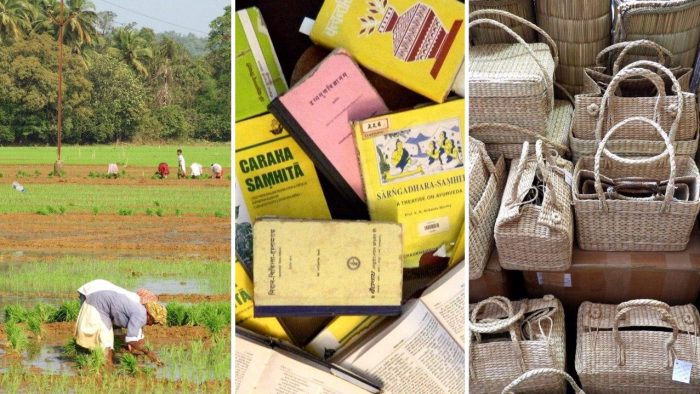Indic Academy is pleased to announce the establishment of a Centre for Indigenous Sustainability. CIS is formed, primarily, to apply the knowledge that we have inherited and thereby to bring about a transformation to sustainability that is both historically well-grounded and contemporary. The pathway to self-reliance in India is best illumined by practices whose origin and methods are from our own civilization and likewise, is best described by terminologies and concepts that arose in our land.
CIS will support and foster, in its opening phase, existing or new ventures and efforts that will have an impact economically and environmentally. Such ventures may remain small and local, or they may develop templates suitable to be adapted and replicated.
Whatever their form, they will be pursuing economic prosperity that is respectful of nature, of the seasonal rhythms that regulate nature’s materials, and whose ethos is to complement instead of exploit.
Economic self-reliance determined by such an ethic requires research, which the Centre will support in the expectation that the learning to be had from such research guide our network of existing and new ventures.
The many events and initiatives Indic Academy has conducted and hosted over the past five years have shown that Indic traditions present a rich seam of material to inform and explain our understanding of indigenous environmentalism. The myriad activities that are today carried out in every one of our districts using nature’s materials, human scale, with each representing a knowledge system, contribute to the livelihoods of many households, both in villages and in urban centers.
CIS has identified three pillars of the self-reliant economy.
– Agro-ecological cultivation with no synthetic inputs
– Ayurveda including the maintenance of its botanical pharmacopeia
– The group of artisanal arts (handicrafts, hand weaves, and village household industry)
These have been the applied channels through which knowledge of nature has flowed throughout our history, whose philosophies are today given meaning through terms such as conservation ecology, sustainable development, and ecosystem services.
The Centre’s twin support for economic efforts and research (with associated knowledge transmission) form its commitment to preservation and promotion of Indic knowledge systems.
For practitioners of our knowledge systems and their material manifestations, the support will help find the answers to persistent concerns: how can skills be better taught, how can crafts produce attract buyers without losing meaning and context, how can the efforts of the eldest knowledge bearers be supported, what can be done to find and retain the interests of the youth?
Through the program of the Centre, Indic Academy will foster a discipline of environmental study and practice that is rooted in dharmic law, conduct, and introduce a development paradigm whose economic self-reliance rests upon an ethic of conservation and rejuvenation.
The advisors to the Centre are Viva Kermani and Rahul Goswami. Their brief profile is given below:
- Viva Kermani is associated with a non-profit organization, Centre for Social Markets (CSM), since 2007 and is responsible for program development. She has worked extensively on climate change impacts in India and has brought a strong development perspective to CSM’s work with local and city administrations, and with the private sector. She guided CSM’s work on sustainable coffee cultivation, developing partnerships with growers’ groups such as the Karnataka Growers Federation (KGF) the largest association of small farmers in the state to build resilience and sustainability in agro-forestry. Currently, as Director at CSM, she is guiding the Fairtrade India Project which promotes ethical and sustainable business practices and building capacities of small and marginal producers in India, under the banner of Fairtrade India to help farmers connect with businesses. In her individual capacity, she has campaigned to keep India free from GM crops, and for wider adoption of indigenous foods, crops, and seeds. She writes on several online portals on this issue. Viva has a Post-Graduate Certification in Environment Management from the School of Oriental and African Studies (SOAS) in the United Kingdom, with a focus on environmental economics, ecology, climate change and development.
- Rahul Goswami is a Unesco Asia expert facilitator on intangible cultural heritage (ICH) and from 2011 has trained government officials, researchers and academics, traditional knowledge bearers and practitioners in 12 countries on methods to identify, document and safeguard knowledge systems. Rahul has served as an adviser to the Centre for Environment Education Himalaya, a specialized center supported by the Ministry of Environment, for over a decade. The centre’s work focused on local pedagogical methods and capacity building for local administrations on watershed management, agro-ecological cultivation, traditional knowledge and cultural practices. He was a social sector consultant for the National Agriculture Innovation Project (Ministry of Agriculture) from 2009-13 to broaden the scope of the agricultural extension network. Rahul continues to be a member of the consultative forum to the UN Food and Agriculture Organization Committee on Food Security.
Disclaimer: The opinions expressed in this article belong to the author. Indic Today is neither responsible nor liable for the accuracy, completeness, suitability, or validity of any information in the article.





